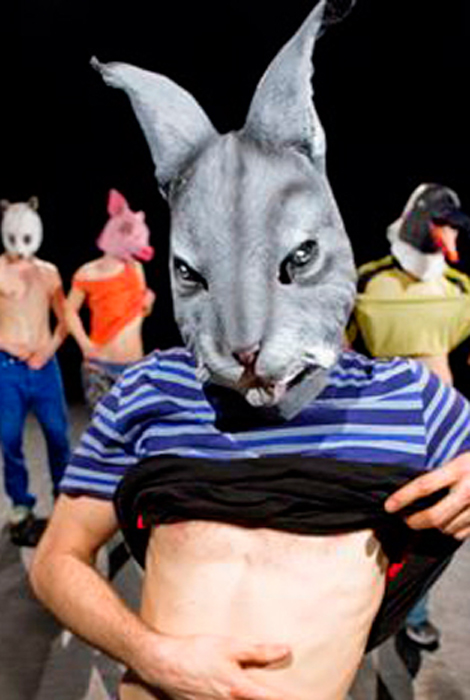Yossi Berg and Oded Graf’s “Animal Lost”
25/07/2011
“It started from the fact that we wanted to have more shows in Israel,” Yossi Berg remarks of the decision to create a second cast for Animal Lost. Berg and his partner, Oded Graf, premiered the work in Copenhagen with an international cast in 2010, and the full-length production has since made a splash with performances at prestigious venues ranging from the American Dance Festival to Montpellier Danse in France. Yet juggling the schedules of the standout cast members, who work as freelance artists throughout Europe, proved a formidable impediment for mounting regular shows in the choreographers’ home country. Recounts Berg, “We would like to keep running the piece on a regular basis in Israel, because it’s quite new and it doesn’t make sense that we are invited all over the world and we are performing all over the world but not here, which is our base. This is how we started the idea of making another cast.”
Now Israeli audiences who have heard the buzz from abroad will get their chance to catch the wildly popular production with locally-based dancers as part of the Suzanne Dellal Centre’s Macholohet (SummerDance) festival on July 29-30. Two of the dancers joining Berg and Graf on the Inbal Hall’s intimate stage are Israelis Ofir Yudilevitch and Ayala Frenkel. Completing Animal Lost’s second cast – and keeping the mix international in flavor – are Olivia Court Mesa and Rosalind Noctor, more recent additions to Tel Aviv’s contemporary dance scene. The new group has a different balance of gender and nationality than the original cast, but ultimately, Berg and Graf believed that these individuals could form the dynamic, cohesive ensemble that drives the dance theater production. “We felt that all these four people have very beautiful energies, and from our experiences, it’s very important to work not only with artists but with people who are very nice and have their unique personalities,” reflects Berg.
While developing Animal Lost with the original ensemble, which continues to perform abroad, Berg recalls, “We dealt a lot with stereotypes and clichés. There’s some truth in this, but also, at the same time, it can be nothing, it can be nonsense. And this gap is interesting.” Restaging the work on the new cast has enabled Berg and Graf to dig further into the subject, to pose questions anew and to discover novel perspectives with this different group of performers. Berg acknowledges that resetting Animal Lost spurred him to search inside himself to find what he wanted to pass on to the dancers, a process that will no doubt enrich his own interpretation of the work.
Audiences returning to the piece may also notice some slight changes, since the co-creators strove to make the dance fit for the local ensemble. Yet the structure has remained the same, and so too has much of the text in which performers proclaim their nationalities, religions, occupations, and hobbies. With some of the declarations based on those made by the original dancers, the tensions between fiction and truth or expectation and reality are heightened, adding an additional layer to this cast’s exploration of cultural stereotypes. Noting that “some things were true and some things were not” in the first cast’s text as well, Berg explains, “We work a lot with this line of how you reach this place that you present it as if it’s true. . . . Some things have the potential of being truth, and these are the places that are important for us to present as reliable, because here we touch the deep place of the subject that we are dealing with.” As the dancers remove their masks on stage this weekend, they will reveal faces that are fresh to Animal Lost, but even in their debut, they are likely to go beneath the surface and probe the production’s theme to its core.
– Deborah Friedes Galili, Dance in Israel

Photo Christoffer Askman